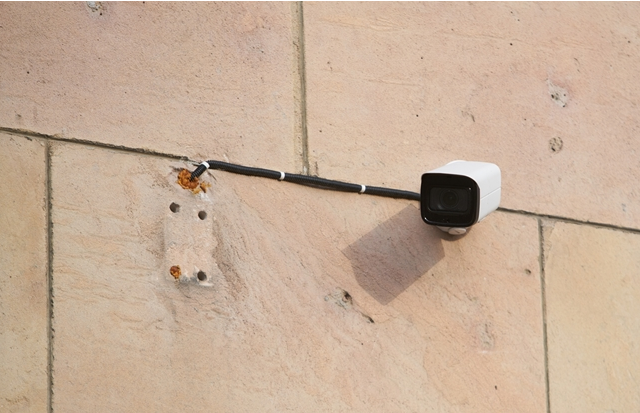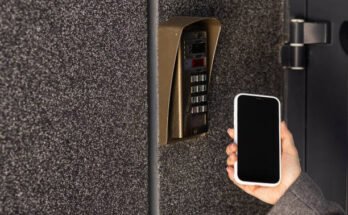1. Introduction
What Are Wired Security Systems?
Hardwired Security systems connect cameras, sensors, and control panels using wires which enable the transmission of information between them. This type of alarm system is the most resilient among other options keeping in mind the protection of the households and safeguarding businesses as well globally.
In this article we will cover almost everything that wired alarm systems are equipped with and include their advantages, hardware and unit installation, setting up, and security system upkeeping.
2. Benefits of Wired Security Systems
2.1 Reliability
A key benefit of wired networks is the dependability of service. Because wired systems may use an interconnected cable to eliminate obstruction, they are demarked out from wireless intercom systems that are prone to signal and connectivity issues. So, they are a good network system for surveillance of your home and commercial properties.
2.2 Privacy & Security
People consider wired connections as less liable to hacking and are therefore much safer than wireless ones. They consider this technology an enhancement of wired security systems because of the low risk of signal interception.
The transmission of data takes place through wired networks rather than radio frequencies so it is much more difficult for trespassers to render access or counter interfere with the system. Hence, this makes wired systems a perfect fitting for environments requiring strict security controls.
2.3 Enhanced Performance
In terms of speed and power, more often than not, wired systems modalities outpace their wireless counterparts. This is because the possibilities of disturbing factors are decreased thanks to direct connections made between the end device and the source whereby for example a switch is used.
An example of this is, immediately an alarm or sensor signs that a person is moving, the wired system sends out signals without hesitation. And this allows for a quick reaction to be made in any unforeseen situation or emergency.
3. Key Components of Wired Security Systems

3.1 Control Panel
Any security control panel works as a central processing unit. It takes input from the cameras and sensors, processes the input and issues output in the form of alarms and/or notifications based on the programmed logic. Such control panels can be linked to a mobile phone or a central monitoring service for real-time communication.
3.2 Wired Sensors
Wired security sensors or cameras are motion detectors that are used for capturing intruders. Such sensors include motion sensors, door/window contacts, and glass break detectors. They are wired directly to the control panel thus ensuring that communications are not distorted if an intrusion occurs.
3.3 Cameras and Monitoring Equipment
Cameras are essential for wired security systems as they serve the purpose of providing real-time clips or other recordings. Cameras with high-definition capabilities today have the propensity to be cabled to the system to target both the indoor and outdoor parts of a facility making it feasible to monitor any suspicious activity.
3.4 Alarm Systems
An alarm system assists the property owner and authorities in identifying a breakthrough response. It is easy to describe the performance of an alarm system in a few words. If we refer to the alarm system’s classification, a wired system can be considered among the most powerful as it can produce sound which is louder than any other wireless alarm system.
4. How Wired Security Systems Work
4.1 Wiring and Connectivity
In a wired security system, sensors, cameras and alarms are interlinked through cables. Depending on the installation standards, these cables are designed to be embedded in walls or ceiling slabs, providing both protection and cosmetic appearance to the wires and devices used in the system.
The wires remain connected to the central control room and send and receive signals in such a manner that the operator can communicate with the devices connected to the system.
4.2 Communication between Devices
In a typical scenario such as an intrusion, if some movement is detected or a door is opened, all the activity is transmitted through wiring to the central control where the alarm unit is located. All the information is directed for resolution, thanks to the control panel, which relays the information needed to place an alarm or send a notification to the property owner.
5. Installing a Wired Security System
5.1 Planning and Design
Ineffective security planning such as installing a security system does a fever calculate placement While placing sensors, cameras, and alarms to ensure that as a whole they offer optimal coverage of the establishment, eager to eliminate blind spots. If in doubt either call a friend or call an installer to focus on the best areas to minimize blind spots.
5.2 Tools and Equipment Needed
To fix the system, you will need some accessories such as drills, screwdrivers, wire cutters and cable clips. Quality wiring and connectors also are a must to ensure all parts are well-joined.
5.3 Step-by-Step Installation Process
- Sketch a diagram for the arrangement of each part.
- Veer the cables through the ceilings or the walls.
- Locate the sensors, cameras, and control panel at their respective positions.
- Link everything together by the control panel.
- Initiate a test of the system to make sure all devices are working properly.
6. Maintenance of Wired Security Systems
6.1 Regular Inspections
For keeping your system in good order, timely regular inspections are a must. This will test the harshest conditions weathering if all the cables are strong and sensors and alarms are working fine.
6.2 Replacing Components
After several years of service, certain components may be consumed hence requiring changing. Regular service can help to prevent them by allowing us to replace defective parts which are most likely to lead to dangers in service.
6.3 Troubleshooting Common Issues
Difficulties with connectors are very familiar, the sensors can fail to detect or even the system can just stop working due to issues. You should be trained in how to fix these issues or utilize the services of a repairman.
7. Comparing Wired vs. Wireless Security Systems
7.1 Pros and Cons of Wired Systems
- Pros: Fast, secure, and reliable with minimal chances of hacking.
- Cons: Heavy, Cumbersome Installation with low flexibility owing to wires.
7.2 Pros and Cons of Wireless Systems
- Pros: Simplified installation, relocation is possible, less invasive.
- Cons: Limited to movement and signal degradation, may not be as secure.
7.3 Which System is Better for You?
There are no right or wrongs, it depends on the intention of the user. If security and reliability are your primary concerns, wired systems would be convenient. And for you to get more flexibility and easy installation, a wireless system would be more appropriate.
8. Case Studies

8.1 Residential Installations
In residential areas, wired security systems serve as a source of reassurance to the homeowner, as they are confident that their properties are fully secured from break-ins and alarm activations during emergencies.
8.2 Commercial Installations
For shops or workplaces, wired security systems guarantee utmost security against theft, vandalism and workplace accidents. Many commercial setups join alarms, cameras and motion sensors to watch over every section of the premises.
9. Expert Insights
9.1 Industry Expert Opinions
Security professionals often recommend wired systems for environments where stability and security are paramount. Many experts also predict that wired systems will remain essential, even as wireless technology continues to advance.
9.2 Innovations in Wired Security
Recent advancements in wiring technology have made wired systems even more efficient, with faster communication and longer-lasting components.
10. Future of Wired Security Systems
10.1 Integration with Smart Home Technology
In the future, wired security systems will likely be able to communicate with other smart devices at home. Picture a scenario where the wired system links up with the smart thermostat, lighting devices and even the voice command devices that are available.
10.2 Advances in Technology
There will always be improvements in wired security systems due to the integration of technologies such as AI Cameras and Remote Cameras.
11. Practical Applications
11.1 Home Security
A wired security system is a reliable method that can be used to protect one’s house as the system will monitor the house through the day and night and send alerts when onset occurs.
11.2 Business Security
Businesses using wired systems can deploy the said systems to look over doors and windows as well as monitor employees and various materials.
11.3 Public and Industrial Security
Wired systems can be used in public places to keep the perimeter in check, for the safety of employees in workplaces, and for taking care of valuables.
12. Conclusion
Their wired security systems have been around for quite a while and have proved to be effective, fast and reliable means of protecting different areas. No matter what the purpose of the wired system is, a residential area, a business, or an industrial area, a wired system guarantees peace of mind and protection from undesired situations.




